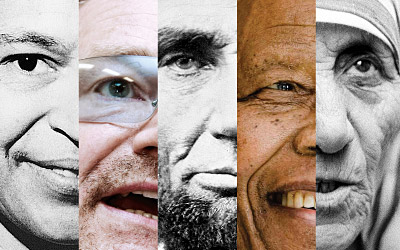Making History: Catalysts for Change

By Reece Carson [reece@spu.edu], Hannah Notess [hnotess@spu.edu], and Clint Kelly [ckelly@spu.edu]
Plenty of leaders are smart. Visionary. Even influential. But not all are transformational.
So what separates leaders who are merely effective from those with the unique ability to engage and transform their societies
and their followers?
That’s a question researchers and scholars in such fields as management and organizational psychology have considered for years. And while no “one-size-fits-all” formula has emerged, researchers have documented certain characteristics necessary for “transformational leadership” to occur.
Among them, transformational leaders — in all fields or endeavors –– listen to their followers and work to help them achieve their fullest potential and satisfy their individual needs. Such leaders engage people to find and implement solutions. And they serve as trusted role models, inspiring their followers to commit to larger goals and even to emulate their lives.
Of course, these traits don’t guarantee a leader who can bring about change. Transformative moments are as much based on forces of the day as they are on the leaders in the moments. Nor do leaders possessing these traits necessarily use them for good. Conquerors and dictators have also shaped cultures and societies. But when leaders combine their influence with a commitment to serving others, they inspire not only the people around them but also generations to come.
So what makes people follow them? How do transformational leaders tap into foundational human needs? And what can we learn from them about our own potential? These 20th- and 21st-century leaders provide some clues.
 |
Winston Churchill
Churchill spoke with authority, integrity, and vision, and it made the difference between victory and defeat for England.
|
 |
Rosa Parks
Parks’ leadership was not verbal, but through her actions, she stimulated a string of creative ways to address the problem of segregation. |
 |
Martin Luther King Jr.
King understood the pain of his audience. But instead of focusing on that pain, he went on to paint a clear vision of a hope-filled future.
|
 |
Mother Teresa
Mother Teresa never set out to be famous, yet her humbleness and faithfulness were so profound that people couldn’t stop talking about them.
|
 |
Oprah Winfrey
Winfrey addresses topics that are intended to help people become the best they can be, and she appears vulnerable and “real” in herself. |
 |
Steve Jobs
Jobs sees his failure as the best thing that could have happened to him. He says he entered perhaps the most creative period of his life. |
 |
Nelson Mandela
Mandela was viewed as someone who was willing to stand up for what he believed in spite of high personal cost.
|
We the Catalysts
Evangelist Billy Graham, who has played a transformational role in his own lifetime, once said, “Courage is contagious. When a brave man takes a stand, the spines of others are often stiffened.”
While scholars can point to certain dimensions evident in transformational leadership, it’s perhaps this quality that best exemplifies people in this role. “Transformational leaders lead others to lead themselves,” says Paul Yost, associate professor of industrial/organizational psychology at SPU. “They release the strengths of others.”
In other words, they see themselves more as a catalyst than a solution. We might not all turn out to be Churchills or Mother Teresas. But our behaviors and actions in our own spheres matter. Think of yourself as a catalyst who can release the potential of others. In the same way these leaders, and countless others, caused their followers to change, how you approach people and how you encourage their strengths might just transform the world.
Return to top
Back to Features Home
|
Share Your Thoughts
How have leaders have made a difference in your life?